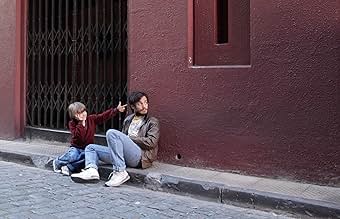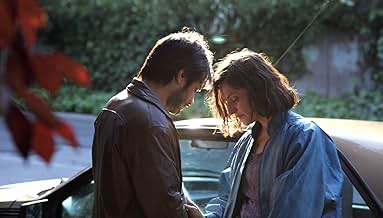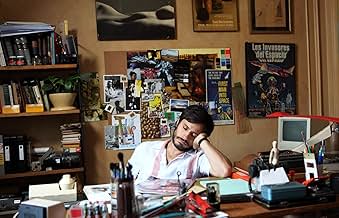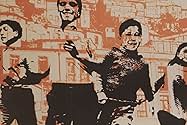एक विज्ञापन कार्यकारी चिली के 1988 के जनमत संग्रह में ऑगस्टो पिनोशे को हराने के अभियान के साथ आता है.एक विज्ञापन कार्यकारी चिली के 1988 के जनमत संग्रह में ऑगस्टो पिनोशे को हराने के अभियान के साथ आता है.एक विज्ञापन कार्यकारी चिली के 1988 के जनमत संग्रह में ऑगस्टो पिनोशे को हराने के अभियान के साथ आता है.
- 1 ऑस्कर के लिए नामांकित
- 15 जीत और कुल 28 नामांकन
कहानी
क्या आपको पता है
- ट्रिवियाSeveral people from the actual "No" campaign in Chile were hired to play members of the "Yes" campaign in the film.
- गूफ़सभी एंट्री में स्पॉइलर हैं
- भाव
Publicista Campaña Sí: [Speaking to the YES Campaign board] If you want to scare people, you have to scare them with their past, their past poverty, long lines to buy bread. The opposition has its cries of socialism, yes. But the only thing that interests people is the scramble, and also they know that socialism is miserable. Instead you have a system in which anyone can be rich. Attention!, not 'everyone'... 'anyone'. You can not lose when all are committed to be that 'anyone'.
- क्रेज़ी क्रेडिटThe opening and closing credits all feature easel paper pads with prologue, title and ending credit roll call, showing a person's hands flipping over each page.
- कनेक्शनFeatured in Chelsea Lately: एपिसोड #7.9 (2013)
- साउंडट्रैकLa alegria ya viene
Written by Sergio Bravo & Jaime de Aguirre
The time is 1988 and Pinochet has been in power since 1973. In a calculated move to mitigate external pressure against his ironfisted regime, Pinochet confidently initiates a national referendum calling on citizens to vote and decide, whether an eight-year extension into 1996 is valid. The probabilities of course, are carefully measured and his likelihood of winning is rock solid.
In this heartfelt homage to Chilean history, both sides are attempting to secure voters by fighting it out via 30-minute spots on TV — 15- minutes for the "Yes" camp and 15-minutes for "No".
An agency that employs René has been commissioned to design a series of ads for the Government of Junta; with bossman Luis Guzmán (Alfredo Castro) helping Pinochet. Conflicts of interest arise when René exercises his liberty as a freelancer in contra — to formulate the opposition's campaign.
Story begins with a cold open showing creative grit — René is previewing a new commercial with clients in the beverage industry. Within the first few minutes, we find out who he really is — a shrewd and introspective creative director, highly sought after in the business, bit of a rebel in the vein of Don Draper — someone who believes in unorthodox methods and selling the notion of freedom.
A sudden visit from opposition manager José Tomás Urrutia, interrupts his meeting with the clients. In conversations between René and José interfused with a dinner scene between René and his boss, Luis — we drift through a climate of skepticism surrounding the legitimacy of Pinochet's reign, residual fears evolved from the red scare, and reservations about United States after their alleged involvement in the Chilean Coup of 1973. Accusations and recriminations are spewed in hushed, civil tones. Disparity in views (as they are in life) are documented in raw, unfiltered strides.
In a sequence depicting René's journey home on a skateboard, audacious visual-aural symphony amplifies his transformation, and the situation about to unfold. A representative of young blood, it is here that Larrain's spunky protagonist displays progressive streak coursing through his veins, thus establishing an emotional, life-affirming choice provoked by his earlier exchange with Luis.
The film charts two narrative blueprints juxtaposed next to each other: the No campaign from inception to post-referendum, and how it is inextricably linked to René's democratic ideology. Against the backdrop of fierce competition between both camps, his middle-class existence as a single father still harboring feelings for the ex-wife comes into close, thematic focus.
When public opinion becomes cultural movement and things begin to swing in favor of No's provocative campaign; hinting at political activism cleverly cloaked in neutral concepts such as love, happiness and freedom, Pinochet's lackeys begin a series of menacing threats that hover in dangerous, unpredictable shadows. Shot with an aspect ratio of 4:3 using analogue tape; the format also implies a cautionary facet to this film — concerned with lasting effects created by commercials in the heydays of TV, suggesting how a simple medium and viral marketing can radically influence political views of the masses, creating landslide victories for the underdog.
Things comes to a hauntingly ironic conclusion, that much is obvious, but No is a tremendously simple film that burns with quiet ferocity. Pablo Larrain displays talent in using visual moods, incisive dialog and dramatic scores; giving shape to the social atmosphere in 1980s Chile — rife with unquenchable thirst for liberty and change, yet pensive and scarred by a violent past.
Although punctuated with flashes of humor and scathing wit, this Oscar nominee in foreign language category is an intense historical drama that works on a deeper level by finding resonance with universal emotions. Passion seeps through every frame, culminating in a mood most aptly expressed by Tchaikovsky's valse sentimentale.
cinemainterruptus.wordpress.com
टॉप पसंद
विवरण
बॉक्स ऑफ़िस
- US और कनाडा में सकल
- $23,43,664
- US और कनाडा में पहले सप्ताह में कुल कमाई
- $71,742
- 17 फ़र॰ 2013
- दुनिया भर में सकल
- $76,99,095
- चलने की अवधि1 घंटा 58 मिनट
- रंग
- ध्वनि मिश्रण
- पक्ष अनुपात
- 1.40 : 1
इस पेज में योगदान दें


![Tráiler [OV] देखें](https://m.media-amazon.com/images/M/MV5BODAzODZiZjEtNWY5Zi00NDU3LWI1NzEtNGZlNDk2YjBlMzkwXkEyXkFqcGdeQXRodW1ibmFpbC1pbml0aWFsaXplcg@@._V1_QL75_UY281_CR7)
























